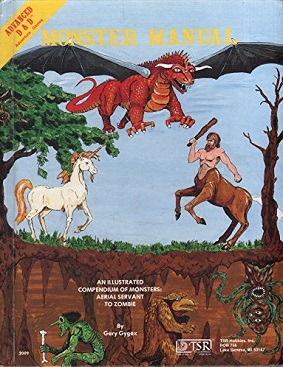On the First Edition of Advanced Dungeons & Dragons
I have an old friend whom I met for the first time when we were about 15 years old at a meet-up for playing D&D, 3rd edition at the time. Now almost 20 years later and many a different veins of interest and inspirations with which we grew up into adulthood, we are at odds about the Dungeons & Dragons game! D&D has pretty much always been a soft spot for me, for reasons that weren't entirely clear for a long time, and perhaps because it was the first table-top roleplaying game I had learned the existence of, and also despite simultaneously being very disappointed with the overall art direction and tone regarding the cheesy wishy-washy vibe of the game, and over-used elements of high fantasy in popular culture. I was never too familiar with the 1st edition of AD&D, and only superficially with the 2nd one, having only heard of THAC0 and many of its campaign settings and adventure modules, but never actually played them. Now all of a sudden we had a discussion about what we think of D&D, or simply, why I like D&D, and why he doesn't like it. That led me to realize that D&D means different things to different groups of people, especially so with the different versions of the game, and different generations of people. What I like about D&D as opposed to other table-top RPG games that I know, as I came to realize in later years, was rather the game mechanics than the story, lore or the character backgrounds, which at this point I have much less interest in compared to the mechanics of the game. The rules of the game are not merely a utility to tell a story, or a nuisance in the way of storytelling. They are "the game". Almost every edition of D&D is a different game, using the same brand name and setting for an almost entirely different game. So I decided to pick up the 1st edition of AD&D rule books this time, and learn it properly.

Monster Manual, 1st edition of Advanced Dungeons & Dragons
I am still in the process of learning the rules of AD&D 1st edition, and I may write up a quick summary of the rules for my own use later. One of the best and concise summary I have found that is describing the combat mechanics is ADDICT.pdf (Advanced Dungeons & Dragons Initiative and Combat Table) compiled by DMPrata, and here is a video that demonstrates one combat session fairly by the books. I strongly recommend having a look at that to get a feel of the combat rules in general. But beware, it is only the tip of the iceberg. Just learning the rules of this game, which I think is one of the appeals to me right now, makes you feel like a wizard, and a judicial expert at the same time, and I highly recommend to anyone who seeks a kind of entertainment that help exercise their brain plasticity.
P.S.
I actually came across a good general summary of rules with some reasonable/like-minded house rules applied. Before I will write up my own, sharing that one here for future reference.